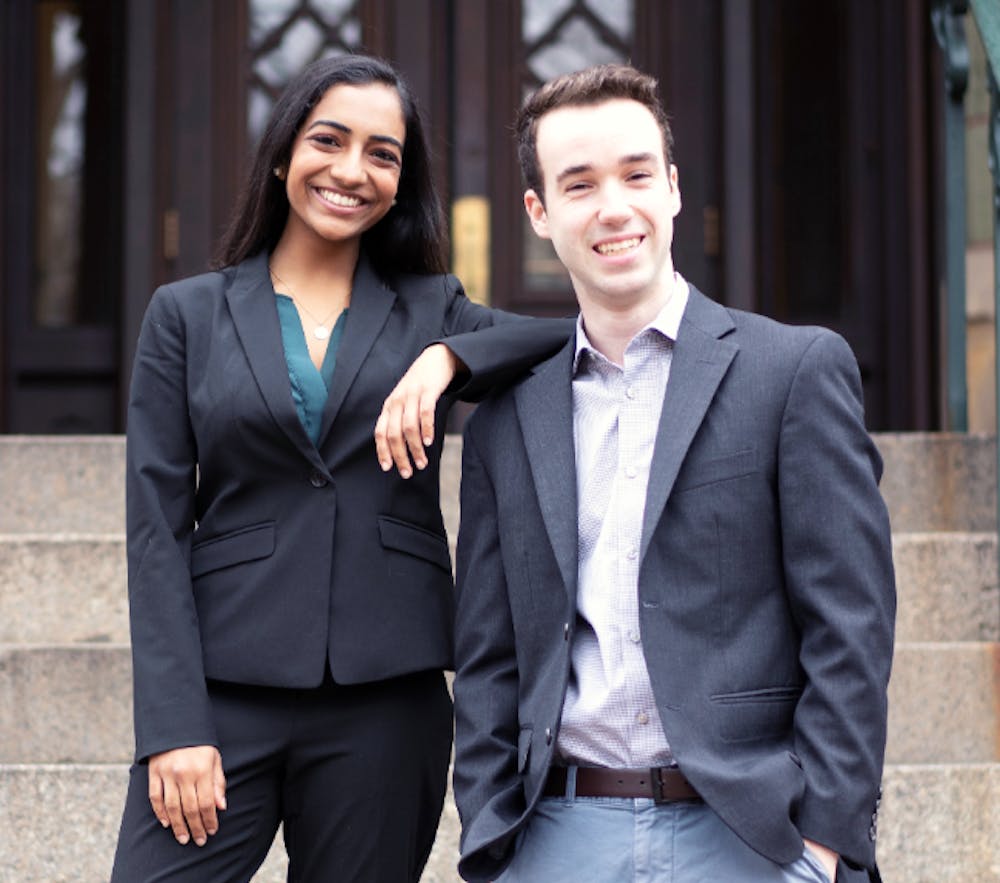
It's that time of year again. The time when people you haven’t met try to pretend like they’ve known you for years. We don’t want to pretend, so let us introduce ourselves. I’m Natasha Menon. I’m a Junior in the College studying PPE, and I have an older brother and two adorable puppies. I’m Brian Goldstein. I am a Junior in the College studying Health and Societies, and I was born and raised with three older sisters. Now that you know a little more about us, here’s why we would like to be your UA President and Vice President!
As the candidates with the most UA experience, we’ve taken all the insights that we’ve gained since Freshman Fall and developed a platform that we think reflects the main concerns of Penn undergrads. Our five priorities for next year include: increasing transparency through connecting both the student body with the UA and student groups with administrators; advocating for inclusivity for marginalized groups by fighting for increased funding and spaces; promoting access to, and increasing the visibility of, current resources on campus; alleviating daily stressors by developing and supporting student and administrative wellness resources; and improving the academic landscape of Penn by strengthening university support systems.
What we mean by transparency is not the buzzword, but rather, tangible communication channels. This past year as UA Speaker, Brian devoted his time on developing increased transparency between the student body and the UA. He introduced an initiative in which UA representatives tabled on Locust Walk and were able to receive direct feedback and suggestions from students walking by. We’ve taken these recommendations to administrator meetings and integrated them into new projects. In the coming year, we hope to expand this initiative by connecting it with other organizations, so that the UA can work side by side with student groups to create change on Penn’s campus.

Regarding inclusivity, we care about uplifting and empowering marginalized communities, and we see that occurring through funding and space. As UA Treasurer this past year, Natasha gained first-hand experience with funding model campuses, and hopes to use this knowledge to benefit minority groups in their efforts to support constituents. As Social Justice committee director her sophomore year, Natasha advocated for the expansion of space for under-represented communities. To continue those efforts, we would like to not only advocate for new spaces in buildings currently being constructed, but also for the reallocation of spaces that are not currently being used effectively, like the third floors of Houston Hall and ARCH, with priority being given to cultural groups, international students, veterans, etc. Additionally, we would like to lobby for greater faculty diversity, as well as cultural and gender sensitivity trainings for staff, faculty, and peer advisors.
Our third pillar is accessibility, which means increasing access to all parts of Penn’s campus. Through the development of comprehensive guides, we hope to promote the recreational, spiritual, and wellness resources that Penn has to offer. Accessibility also means reducing barriers to joining student groups. Over the past 3 years, Brian has worked to reduce club exclusivity by designing and instating a set of rules to improve club recruitment policies. Through this initiative, more clubs have developed an open membership structure, which has allowed students from all different backgrounds and communities to get involved on campus. In the coming year, we hope to also work with the administration to ensure affordable dining, retail, and transport options.
Wellness is another tenet that we wish to focus on next year. We will persistently lobby for the staff psychologists at CAPS to better reflect the diversity of Penn, as well as for embedded models not just in each of the schools, but in spaces where communities congregate, like Penn Women’s Center and ARCH. We also believe that supporting the other aspects of wellness —occupational, spiritual, physical, etc. are vital to improving mental wellness on campus, which is why we will work to bolster those resources on campus.
Last, but not certainly not least, is academics. We have two main priorities when it comes to improving the academic landscape: expanding the tutoring and academic support systems on campus, and improving the advising networks across all four schools. We hope to promote the academic support systems by advertising the resources in appropriate locations, whether that be in DRL, ARCH, or Huntsman Hall, as well as destigmatizing the utilization of tutoring services. In order to create a more cohesive relationship between advisor and student, we hope to pair students with pre-major advisors based on background, interests, and/or identity. Through improving the academic environment at Penn, we hope to make your time at Penn more meaningful.
Just this past year, Natasha successfully allocated the UA budget of $2.6 million to student groups, while Brian smoothly on-boarded UA Associate Members and ran every GBM efficiently. However, we still have work to do. Our platform is certainly not exhaustive, and we are open to feedback.
So, what do you want to see changed at Penn? We truly believe that your voice matters. Our platform is a living document, and we want to get your insight on how to change it. Check out this link to provide your suggestions! You can also email us directly at namenon@sas.upenn.edu and brgold@sas.upenn.edu.
We are humbled and excited to have the opportunity to lead the Undergraduate Assembly next year. As the candidates who have the knowledge necessary to execute our platform, we know we can create change that will benefit Penn students for generations to come.
The Daily Pennsylvanian is an independent, student-run newspaper. Please consider making a donation to support the coverage that shapes the University. Your generosity ensures a future of strong journalism at Penn.
Donate







